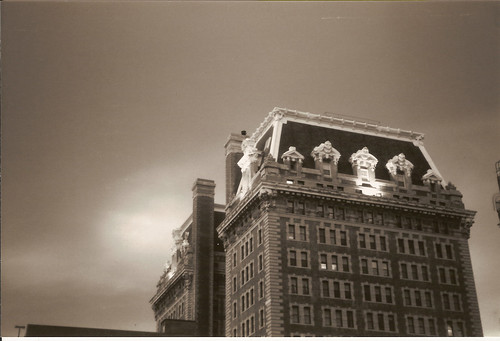Baltimore doesn’t like The Wire. Let me clarify that. It’s not that the citizens of Baltimore necessarily dislike HBO’s program—some even love it and recognize it as the great work of art it is—rather, the city, if you can allow the city to be personified by it’s various bureaucratic apparatuses, feels like it got a raw deal. I’m not going to argue that point, but suffice it to say that as great as the show is, and as colorful as its characters are, you probably wouldn’t want to live in that city.
The Real Baltimore, however, is not that city. The governor, the mayor, the chief of police, and the city council go to great lengths to stress that the Real Baltimore is not the pit of murder, drugs, and corruption occupied by Jimmy McNulty, Stinger Bell and the rest. The Real Baltimore is a nice place.
Then our mayor got indicted and is now standing trial, accused of stealing. Accused of stealing giftcards. Accused of stealing giftcards intended for needy families. (Sigh.) Mobtown can’t catch a break.
With that in mind, I felt that this was a good time to reflect on my favorite Baltimore movie. The Baltimore movie is a rare thing. Outside of the work of John Waters and Barry Levinson, no one really makes Baltimore movies. There are movies set in Baltimore, and some go even further and incorporate one or two of the city’s unique tics and gestures, but they aren’t really Baltimore movies. Men Don’t Leave had Jessica Lange’s grieving family move to Baltimore where a young Chris O’Donnell hooked up with a very Baltimore-weird Joan Cusack, but it wasn’t a Baltimore movie. The Christian missionaries from The Mosquito Coast were based out of Baltimore, and Harrison Ford’s ill-fated journey kicked off from there, but that, of course, was not a Baltimore movie, either. The Curious Case of Benjamin Button could have been a Baltimore movie—after all, the original story was set in my neighborhood by famous Baltimore drunk F. Scott Fitzgerald—but New Orleans used some hurricane guilt (and some hefty incentives) to steal away the production.
So we’ll pass those by and move on to what I consider real Baltimore movies, and of those, my favorite: (drum roll, please) John Waters’ Pecker. A controversial choice, perhaps, especially considering Barry Levinson has made amazing Baltimore movies like Diner and Avalon. Those films bring vividly to life the Baltimore of his youth, but that’s his city; it’s a Baltimore of another era, one that doesn’t exist anymore (certainly something Avalon laments). It’s not my Baltimore.
Pecker is my Baltimore. The film tells the story of Pecker, played by Edward Furlong, a photographer who takes pictures of the things he sees everyday. When his work is discovered by a New York art dealer, he becomes a sensation, which ruins his life (it’s a comedy, so maybe ruin is a strong word).
At first, the film seems to be merely a collection of Baltimore cliches: crabs, pit beef, full-bush lesbian strippers and teabagging trade dancers. But Waters doesn’t use these things gratuitously, and he’s not interested in ticking off items on some Baltimore checklist. The people and the things that make up Pecker’s world are very much a part of the fabric of the city, and just as Pecker snaps away at the things that he find beautiful around his home, Waters lovingly does the same. It’s something that he would find increasingly difficult in later, lesser works like Cecil B. Demented and A Dirty Shame, which seem to approach Baltimore from a distance.
It’s personal in a way that his last two films weren’t, as well, and at its heart it grapples with the sometimes-Sisyphean task of balancing his roots with his newfound popularity; it’s easily among his best work, and in it he manages to capture some truth about his home town—a city that is beautiful despite the post-industrial grit and grime, one that is unapologetic about its scars and un-ironic about its look and mannerisms. Pecker’s art is fetishized by the New York scenesters, but they don’t really get it. To them, the work shows a something scary, exciting, hyper-real even; to Pecker (and to John Waters), it’s just life.
Unfortunately, Baltimore is a hotbed of the same kind of scenesters today. They ironically embrace the “quirk” of the city—the fashion, the bad hairdos, the pink flamingos and the Natty Boh (which hasn’t been brewed in Baltimore in decades)—and I wonder if sooner or later Baltimore will cease to be what it is and instead become “Baltimore.”
Fortunately, however, John Waters preserves the city on film. Go on over to your Netflix queue and order up some Pecker (!). It’s funny, sweet, very quotable, and an underseen gem that’s lost among John Water’s more popular and shocking work.
“She seems kind of scary,” Pecker’s friend Matt says of a photo’s subject. “I don’t know,” Pecker replies, “she looks kind of proud.” Maybe that’s a good way to describe Baltimore; scary looking, but also proud.
Which reminds me, I’d like to include a photo with each of these. Maybe something new, or maybe something from my vault. Here’s a shot of my favorite building in Baltimore, The Belvedere Hotel, taken from my window.
